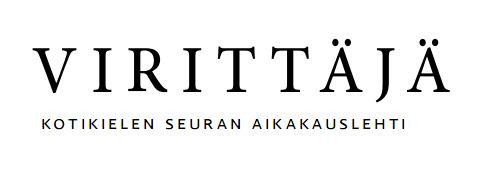Ymmärryksen ymmärrystä
Avainsanat:
kielifilosofia, yleinen kielitiede
Abstrakti
Phenomenology and linguistics (englanti)3/2001 (105)
Tapani Kelomki PHENOMENOLOGY AND LINGUISTICS
The article examines the Merleau-Ponty phenomenological view of language and its relationship to linguistic views and linguistic methodology.
The Merleau-Ponty concept of human beings based on the idea of an abstract body is first discussed, which is critical of any distinct body-mind dichotomy. This psychophysical concept forms the foundation of Merleau- Pontys view of language and comprehension. He stated that language is made up of (abstract) gestures. It reveals peoples intentionality, and their ability to orientate themselves in the world and to change the world. Merleau-Ponty asserted that language is dynamic and fuzzy, and not based on representations which convey discrete entities and their relationships. Language is intersubjective and historical on the one hand, and conveys emotions on the other; the emotion may even be the emotive expression itself or its apparent manifestation.
Merleau-Ponty sought to understand why language should be meaningful and how, therefore, comprehension is possible. He treated comprehension as empathy, as existing in the same emotive state: The speaker sings the same tune as the listener. Merleau-Ponty succeeded in answering his question: the feelings apparent from the speaker are the content being expressed.
As a criticism of the Merleau-Ponty view of language, the writer states that comprehension cannot generally be considered language-external or independent of some kind of representation. Without representations no absent meaning can be conveyed, nor can language forms or structures which link it to something external be explained (Peircean symbols).
Overall, the Merleau-Ponty concept of human beings is broader and more profound than that of analytical philosophy or structural linguistics, but, in methodological terms, phenomenology alone does not provide a sufficient basis for linguistic research.
Finally, the writer notes that linguistics has become much more diverse in recent years, making considerable progress in many different areas. This includes significant steps in the direction of phenomenology.
Viittaaminen
Kelomäki, T. (2001). Ymmärryksen ymmärrystä. Virittäjä, 105(3), 362. Noudettu osoitteesta https://journal.fi/virittaja/article/view/40110





